Thursday, December 22, 2005
Google Moods
Current google celebration. Google in a holiday moode. would be the last for this year too.
Happy Halloween - October 31, 2005 . Halloween celebrations in western countries include crappy dressing..that will indeed scare u (yuck!). The term got derived from "All Hallows Eve" celebrated in Ireland. Well, Halloween is more famous in US than in other countries...do you know why ? Most of the US population's ancestory can be traced to Irish who moved from their home land in search of a neutral land where there is no influence of religion on their life. and they founded (not exactly) USofA.Now, I have you another question. This is why secularism was one of the principles inbibed in the constitution draft
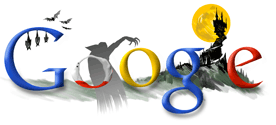
Celebrating Google's 7th Birthday - September 2005 . Happy birthday to you..happy birthday to you..happy birthday to you google !!!..happy birthday to you. may geeks bless you...happy birthday to you.

Anniversary of Lunar Landing - July 20, 2005
Independence Day - July 4, 2005 . American independence day. theirs 229.

Happy Father's Day - June 19, 2005. Appa'vukaaga edhu appavukaaga
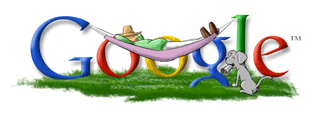
Frank Lloyd Wright's Birthday - June 8, 2005 . Wright is a distinguished american architect.

Mother's Day - May 8, 2005. Annai oru aalayam

National Teacher Day - May 3, 2005 . Something like our own september 5th.

Earth Day - April 22, 2005 . Let me join google our earth to make as peaceful and beautiful as depicted in the picture below.
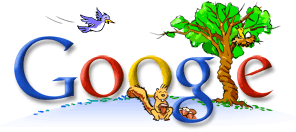
Leonardo da Vinci's Birthday - April 15, 2005 . Master of all trades. salutation to you. He is a historical legend...no need for my articulation here.
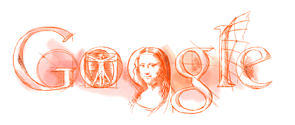
National Library Week - April 10, 2005 . celebrated in US...do we have something like this? update me.

Google celebrating Vincent van Gogh's Birthday - March 30, 2005 . famous painter. Had little success duing his lifetime but fame knocked at his graveyard posthumously.
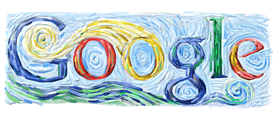
World Water Day - March 22, 2005
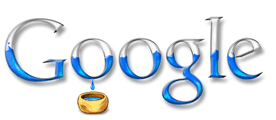
Happy St. Patrick's Day - March 17, 2005 . Patron saint of Ireland. Day celebrated mainly in Ireland. recognised by the roman catholic church as 'Feast day'.

International Women's Day - March 8, 2005 ...a day for the 'shakthi'

Happy Valentine's Day - February 14, 2005 ...jai anjaneya...my comments not needed here...history tells us that Valentine was once a 'pagan' festival for celebrating the nature and the reproduction. it was converted (forcefully..and now lost in history) to a christian tradition.

Chinese New Year - February 9, 2005 . Found out my chinese sign is 'Rat'...let me know ur birthday, i will find out what animal you are.

Happy New Year! - January 1, 2005 . Welcome 005.

Wednesday, December 21, 2005
What's this sixth sense buddy?
Ironically, recent studies show that animals do show signs of possessing the human touch ....a recent research shows that Bees can distinguish and recall different human faces, rats can navigate through mazes, solves puzzles, match objects and shapes and even associate smells with previous experiences...
Wonder why man is called a 'social animal' -- ha, yes his tendency to recall human faces, appetite for gossips and naviagate through parties, solves gossip puzzles, incredible ability to associate to social animals -- living the page 3.
Ah, these animals are doing the same thing with a brain that is 20,000 times less massive than the human brain. And what the hell are we doing with this 2-kg grey matter of ours?
Thursday, December 15, 2005
Secret of mona lisa's smile revealed
Scientists drew on a database of young female faces to derive an average "neutral" expression, which the software used as a standard to compare the painting against.
Tuesday, December 13, 2005
Bring out the scientist in you
I used to dream that I am like Albert Einstein. What I am trying to say in my dream i was of Albert Einstein in my last avatar (this is for real, not like a story sensation) -- the millenium man himself.
I suddenly stumbled upon this (not) very serious personality quiz which tries to match personality resemblance to scientist of fame
I answered the question one by one, and atlast, bang came the answer -- my dream coming true. I was indeed Albert the Einstein.
You see, I am just not divulging the answers as I don't want competition for my claim.
Take the personality quiz yourself here:
http://www.abc.net.au/science/explore/einstein/quiz2/
May be you too are some scientist in your previous avatar. But donot post comments if you are diagnosed 'Albert Einstein' syndrome
Monday, December 12, 2005
Why the sky is blue
But where does this bottomless blue colour come from?
Myth: Reflection of the blue color of the ocean which covers two-thirds of the planet
Reality: Both the sky and the ocean get their blue color from (white) sunlight being scattered from the tiny molecules that make up our atmosphere and our oceans (Remember your school chemistry 101 -- all particles are made up of molecules and molecules of atoms)
How: Shortly, its due to a phenomenon called 'Raleigh Scattering' propounded by Lord Raleigh. We all know that light gets scattered when it hits any particles and when it hits, is absorbed, and then, is re-emitted. The light might get changed between being absorbed and emitted, changing in (say) brightness, or angle at which it is emitted, or even colour. We have the 'blue' color since the emitted light travels in a right angle when hits any particles and blue color is strong when the light moves right angle
More Explanation:
Now here's the essence of Rayleigh Scattering. First, the re-emitted light does not come out of the molecule in the direction from which it came - instead, it comes out mostly at right angles to its original direction. Second, the "right-angle bending effect" is much stronger for blue light than for red light, so the emitted light is predominately blue. The red light goes mostly straight ahead, and then back out of the atmosphere into deep space - and so you never see it. Third, your eyeball will register seeing a colour only if some light of that colour lands inside your eyeball.
So white light will hit a gas molecule, but bluish light will come out - and at right angles to the original direction. This light will then travel in a straight line until it hits another molecule, and the whole absorb/emit/right angle/blue thing happens again. So the light that came from the sun will hit a gas molecule high in the atmosphere, and then will stutter in a zig-zag fashion down towards the ground. Each time the light hits a molecule, the light comes out mostly at right angles to its previous direction of travel - and each time, it's more blue in colour. Eventually, some light that has been through thousands of these absorb/emit situations with thousands of molecules will land in your eyeball - and then, and only then, do you get the impression of seeing blue.
There you have it - the sky is blue is because of Rayleigh Scattering by the nitrogen and oxygen molecules in the atmosphere. And the ocean is blue because of Rayleigh Scattering by the water molecules that make up the water, as well as reflecting the sky. And that's why, regardless of what Dorothy sings in the Wizard of Oz, blue skies happen in most places, not just over the rainbow.
The Really Deep explanation of why the sky is blue is hard. Albert Einstein wrote, in 1911, that Relativity had to be used to fully understand why the sky is blue.
Source: www.abc.net.au
Reference: Karl Kruszelnicki
Thursday, December 08, 2005
Death is a New Invention
From the moment we're born, we begin to die. But death is actually a fairly new invention. Death has been around, as a natural way of life, for only a small percentage of the time that life has been on our planet!
Our planet is about 4.6 billion years old. (A Billion is 1,000 million.) Life began about 3.8 billion years ago - and for most of that 3.8 billion years, living creatures were effectively immortal, and did not die. From 3.8 billion years ago, to one billion years ago, each living creature was made up of a single cell. So a single-celled creature would grow to a certain size, and then split into two, and each of those two cells would then keep on growing until they divided and so forth. These single-celled creatures would never die of old age. They might die from being run over by a rolling stone, or by being eaten by another bigger single-celled creature - but apart from that they would not die.
But about 1 billion years ago, some of the single-celled beings evolved into creatures with many different types of cells. These new creatures had some cells for thinking, other cells for moving, other cells for digestion, and so on.
Death too is advantegeous:
And at the same time, death was born. It seems odd, but there actually are a few advantages to dying - at least, as far as the species is concerned.
Firstly, an immortal species can't adapt to any changes in the environment - only their children, with a slightly different DNA, could. Another disadvantage of immortality is that the parents and their offspring would be fighting for the same amount of food. And thirdly, the DNA of these immortal creatures would constantly be damaged by radiation from space, and chemicals in the environment, leading to more defects in the eggs carried by the mother.
Aging Theories :
Now it might sound unbelievable, but we really don't know why we age, but we do have a lot of different theories.
The first one is the environmental theory. It looks at the environment that the cells inside living creatures survive in. For example, various chemicals may gradually build up in various parts of the body, giving the cells a less pleasant environment to survive in.
And yet another theory says that we are just plain programmed to die. There's a little genetic clock inside each cell, and once it has gone through a certain number of divisions, the cell dies.
The metabolic theory of aging is like a "wear and tear" theory. It basically says that we have a limited number of days of life, and the harder we work, the sooner we use up those days.
Another theory is the error theory. It says that as we age, we get more errors in the DNA, as it divides and divides with each successive generation of cells. For example we humans have 46 chromosomes in our cells. But in human females, the percentage of cells with the wrong number of chromosomes, increases from 3% in ten-year-old women, to 13% in 70-year-old women.
A third theory is the autoimmune theory, which says that when you're born, every cell in you is immunologically identical to every other cell in your body. But as time goes by, the immunological signature of some of your cells changes, and so your body's immune system starts attacking your own cells.
Now, as we get older, our bodies change. Our eyes can't focus as well. Our skin becomes less elastic, and our bones gradually lose calcium. Our lungs can't hold as much air as they used to. As we get older, our kidneys can't concentrate our urine so well. This means, that to dump out the same amount of waste, we need to add a greater volume of water.
But recent research shows that perhaps there is one surprisingly easy way to survive to a greater age, AND in a state of good health.
Party-II
Rats & four-legged animals:
Death is a fairly new invention. Even today, we really don't know why we get old, and then die! But there's a surprisingly easy way to live for a longer period of time, in a greater state of health and here's the simple secret - just eat less!
Sixty years ago, Clive M. McCay and his colleagues at Cornell University placed rats on a very low calorie diet. They were astonished to find that they could increase the maximum lifespan of their rats by one third - from three years to four years. They also found that these rats on the low-calorie diet stayed younger for longer, and had fewer of the diseases that their fellow rats on a standard diet got as they grew older.
Since then, various scientists have experimented with all kinds of creatures (spiders, water fleas, guppy fish, various parasites and so on), and have been able to increase both the average lifespan, and the maximum lifespan.
Average Lifespan and Maximum Lifespan:
Now there's a big difference between increasing the average lifespan and the maximum lifespan.
Increasing the average lifespan just means stopping unnecessary and premature deaths - such as deaths from car accidents, infectious diseases which could be easily stopped by vaccination, heart disease, and so on.
And yet, that's what reducing the calories seems to do.
But increasing the maximum lifespan is a whole different kettle of fish. If you can increase the maximum lifespan of various members of a species, you're somehow fooling around with some basic aging process.
How about the two-legged animals:
Now we know that this "reduced calorie-intake increased-lifespan thingie" works in quite a few animals, but we haven't fully tested it in the two-legged animals. That began only about 15 years ago, when two separate groups of scientists began testing rhesus monkeys.
It's early days yet, but already there are quite a few interesting changes. As you would expect, the monkeys that have been eating 30% fewer calories, weigh about 30% less, and have only 10% of their body weight as fat - instead of the normal 30%. What is interesting is that all of their measures of health, even a few years into the experiment, are those of much younger monkeys. So the skinny monkeys have lower blood pressure, lower blood glucose level, lower insulin level, much lower blood cholesterol, and so on.
We have not yet done the same experiment with humans. There's no point in looking at people that have been forced by poverty to live on very low calories, because usually their low calorie diets don't give them enough essential nutrients.
So if you want to increase your life expectancy, you can't begin this calorie restriction thing when you're a child. The age of 20, as a starting point, would probably give you the greatest extension of life, but it's never too late to start. And it also seems that you can't simply go cold turkey and suddenly reduce your calories by 30% - you need a gradual tapering off. And most importantly, with a low-calorie diet, you still need to have your essential nutrients. You would have to select your foods extremely carefully, and probably have to take vitamins as well.
And there would be side effects, besides being hungry a lot of the time. A woman whose weight is very low, might not ovulate, and so could not have babies. And this lack of ovulation could lead to increased osteoporosis. Indeed, Professor Stewart Truswell, of the Sydney University Human Nutrition Unit, said that while the current scientific studies were interesting, "it certainly wouldn't make me go and eat less than I normally eat."
On the other hand, most of us could certainly afford to lose a little weight, and if we did it in a gentle fashion there would be hardly any side effects at all, while it really is eating lots. Just remember, the outcome of life is inevitably death - and all we're really doing is putting off, for a little while, the inevitable....
Further listenings:
Listen to Karl talk about Death is a New Invention Part-I
Listen to Karl talk about Death is a New Invention 2
(You will need Real Audio which you can download for free)
© Karl S. Kruszelnicki Pty Ltd 2003.
Sunday, December 04, 2005
Tips for Searching Google
by Gary Price --> source: www.virtualchase.com
Limiting by date can be a problem. Genie Tyburski and I wrote an article about this last year. Date searching is reliable only when Google can consistently identify them as it does with Usenet message (Google Groups) and news (Google News).
A potentially useful way to limit the scope of a search is to use the syntax for file type (filetype:). For example, filetype:ppt google finds mention of Google in PowerPoint slides. Other formats include .pdf (Adobe Acrobat), .doc (Word) and .xls (Excel). Other search engines also let you query these formats.
You can use an asterisk (*) as a wildcard. Example: "George * Bush" finds George W.
Bush. Example: "To * * * to be" finds "To be or not to be". I've used this strategy to find email addresses: "email * * <domain>".
Some documents are not completely indexed by Google. Indexing of the text in Web pages stops after 101kb (For PDF, it's 120kb.)
Google limits the number of search terms to ten.
Not every Google version offers all of Google's features. For example, Google via the Washington Post does not offer the cache or similar page options.
Finding out who links to a Web page is popular. You use the link (link:) syntax. However, you
cannot limit the search using additional syntax. For example, you cannot discover which .edu sites link to the home page of The Virtual Chase. The search link:www.virtualchase.com site:edu does not work. AllTheWeb, on the other hand, lets you add additional syntax to a reverse link search.
For the most part, search engines display one result per domain. For example, enter "competitive intelligence" "new york". Google returns two listings from SCIP. To see additional pages from the same domain -- scip.org, you have to click the "more results" link.
Search terms are linked to dictionary definitions via Dictionary.com. Find the link near the top of the page in the blue bar. Other engines also offer this feature.
Using Google UncleSam, limits your search to material from government sites.
Findlaw also offers a focused version of Google. The filter boosts the relevancy of legal and government information. See LawCrawler.
Google is wonderful, but it is not the only Web search tool. Take a look at Teoma, AllTheWeb and Vivisimo.
Finally, learn about and bookmark specialized or, as a professor at Penn State calls them, niche databases. This can save you time and aggravation. Examples include the new keyword searchable version of The Wayback Machine or the even newer SMEALSearch, which indexes freely available, scholarly business information.
Gary Price (Gary Price Library Internet Research Consulting) is the author of the essential Weblog for searchers, The ResourceShelf.
Google Sandbox Effect: What the hell is it ?
A site is sandboxed when it is new and does not rank for keyword phrases that are not incredibly competitive (such as a unique company name) in Google after making the page "search engine friendly" and after being indexed. This phenomenon, the techies describe as Google Sandbox Effect
A sandboxed site doesn't means a site that has not been indexed by Google. That is wrong. Sandboxed sites are very much so indexed by Google, but have a hard time ranking for keyword phrases, no matter how competitive they are.
Origin of the name:
Guys from Search Engine Roundtable found existence of some form of issue with Google and new sites. The first post was named New Sites = Poor Results in Google, that was before it had a name. In a WebmasterWorld thread linked to from the "New Sites = Poor Results in Google" entry, the term "sandbox" came about. Later on, guest author SEO Guy posted an entry here using that title The Sandbox Effect, which helped make its name
Does the sandbox really exist?
Google engineer Matt Cutts has essentially acknowledged that a sandbox effect exists and that it's a product of their algorithm, and at least one other anonymous Google engineer is reported to referred to a "probation" period for new sites. Despite some differences in terminology, the sandbox as an abstraction for a specific sum of parts in Google's larger algorithm is almost certainly existent.
How long are sites sandboxed?
The reported sandbox period is extremely variable; ranging from 3 months to indefinite, the typical range though seems around 6-9 months, and one Google engineer has reportedly stated the actual range is 6-12 months. Many have observed that the period appears to correlate with industry competitiveness/popularity, with the most popular and commercial industries having the longest "probation" period.
10 methods to bypass or escape the sandbox
Note: I've avoided listing methods aimed at only minimizing your time in the sandbox—as opposed to methods of actually escaping it—as those are basically paramount to good SEO practises, which is obviously way beyond the scope of this article.
- Buy out old domains—Even if a domain is low on inbound links, the age factor will almost certainly be enough for it to have expired the sandbox; typically a year is good age to ensure a domain is sandbox free; if possible negotiate with original owner keeping the WHOIS record as similar as possible to prevent triggering a fresh sandbox cycle. Domains never indexed in Google, no matter what how early registration date aren't likely to avoid being sandboxed.
- Buy recently expired domains—Some theory as above, but applied to domains that have actually expired. There is some evidence to suggest very recently expired domains can avoid a fresh sandbox cycle. A good measure might be domains expired but still indexed in Google.
- Collect the low hanging fruit—While sandboxed you aren't going to rank well for competitive terms, but you may be able rank for low traffic ones. Large quantities of low traffic terms can be just as rewarding, and if you target the right ones you'll be strengthening the theme of your site for when your more competitive terms are freed from the sandbox.
- Drag your competitors down to your level—We really don't condone or recommend this; it's listed here for completeness sake, and to make you aware of tactics that can be used against you: If you can't aspire move upwards, the second option is to drag your competitors downwards, into and below the level of the sandbox. StuntDubl summarizes the main blackhat tactics at the disposal of those who willing to cross the line. Even if we did recommend this, logistically it's a non-option since you'll no doubt have hundreds or thousands of competitors' pages ahead of you, not to mention that each one of those competitors can use the same tactics against you.
- Buy your way in—Irregardless of sandbox status, you should almost always consider doing at least one PPC campaign for each of your targeted terms, in order to estimate the ROI before spending resources targeting terms organically.
- Explore non-Google traffic sources—Getting sandboxed clearly illustrates the danger of putting your eggs in one basket. Consider using your time in the sandbox to explore and make full use of other sources of targeted traffic, learn to survive without being at the whim of Google.
- Hijack your competitors rankings—Again, we don't condone or recommend blackhat tactics: Performing a 302 redirect to one of your high ranking competitors from a non-sandboxed domain (preferably of higher PageRank/trust than theirs) can sometimes succeed in hijacking their SERP listings. So that the traffic can be gleaned, the redirect can be cloaked for the benefit of the Google-bot, with regular visitors being redirected to your sandboxed site. Again, we do not recommend this, and only on small number of occasions have such tactics been publicized to work.
- Use subdomain from developed site—According a quite a few experts; since sandboxing appears to be based on 2nd level domain, hosting your site on a subdomain of an already established domain will avoid the sandbox. If you redirect all pages to the new domain once the site appears thoroughly indexed; it should reportedly maintain a non-sandboxed status.
- Acquire "trusted" links—A fair amount of SEOs have claimed to have escaped the sandbox by acquiring enough "trusted," high quality authoritative links. The most often cited source for links capable of freeing a site are high profile news sites; .gov, and .edu sites; and dmoz.org. That this method can immediately free you from the sandbox is somewhat contested, but most seem to agree that it can either a) avoid being initially sandboxed, or b) shorten your stay. At least one Google engineer is reported to have supported the theory that high quality backlinks can negate the sandbox.
- Perhaps you aren't sandboxed after all—Consider and research into the possibility that you aren't sandboxed and instead simply suffering the effect of a very ineffective SEO campaign. For this purpose SEOMoz.org offers the Sandbox Detection Tool.
Definition and origin borrowed from www.seroundtable.com
10 effective methods borrowed from www.webmasterbrain.com
Is Google Search Over Hyped?
Google is supposed to be the defacto queen of web search. Or so it look likes. Until now, even I thought so. Recent blind study finds not so. Is it a myth?
Guys from www.webmasterbrain.com began a Search Engine Experiment to discover which of the top search engines really offers the most relevant search results. With 5,000+ participants thus far, the below Pie reveal the results as they currently stand:
The modes operandi works like this -- the user is asked to key in a search string. Results are fetched from the three search engines branded as (brand x, y & z) and user is asked to judge which search engine is most relevant. The surprise is.......
Current results show Google offered 42% relevant results compared to 33% for Yahoo and 27% for MSN. This is not a great performance considering the close figures by yahoo & MSN and the much hype surrounding Google Search. Though, Google is clearly the leader, the margins are not so high to make it the defacto engine as perceived.
(Note: the image above is updated automatically, so you will probably be seeing newer figures than written).
They are planning to experiment indefinitely with the test results automatically updated every 15 minutes. The updated results will be shown in the images above and below.
Readers can take the blind test to find out which search engines' results you personally prefer.
Included is also a disclaimer that despite best efforts at making the test fair, and prevent cheating, they remind that by no means the accuracy of these test results can be gauranteed.
So watch out this blog.